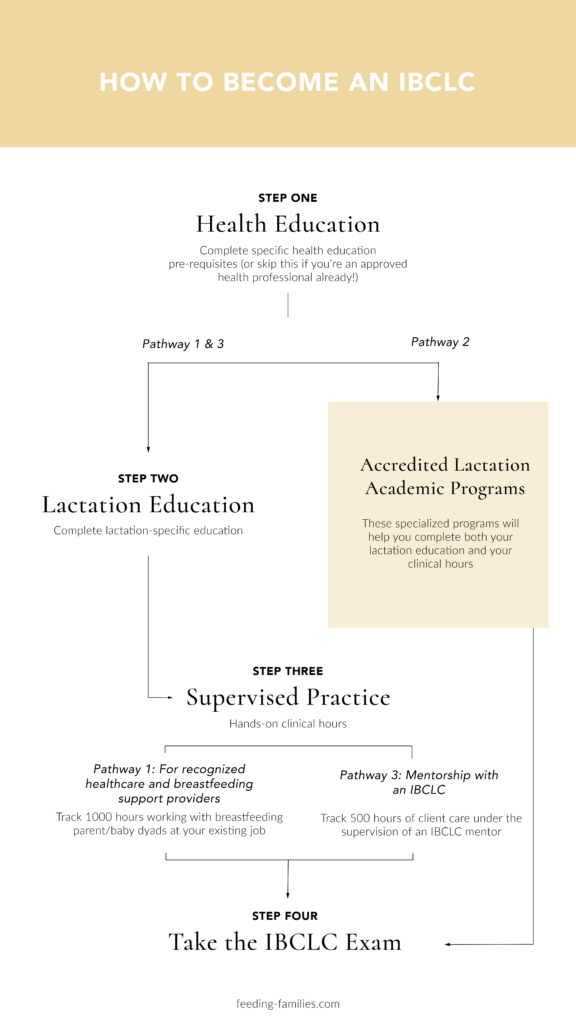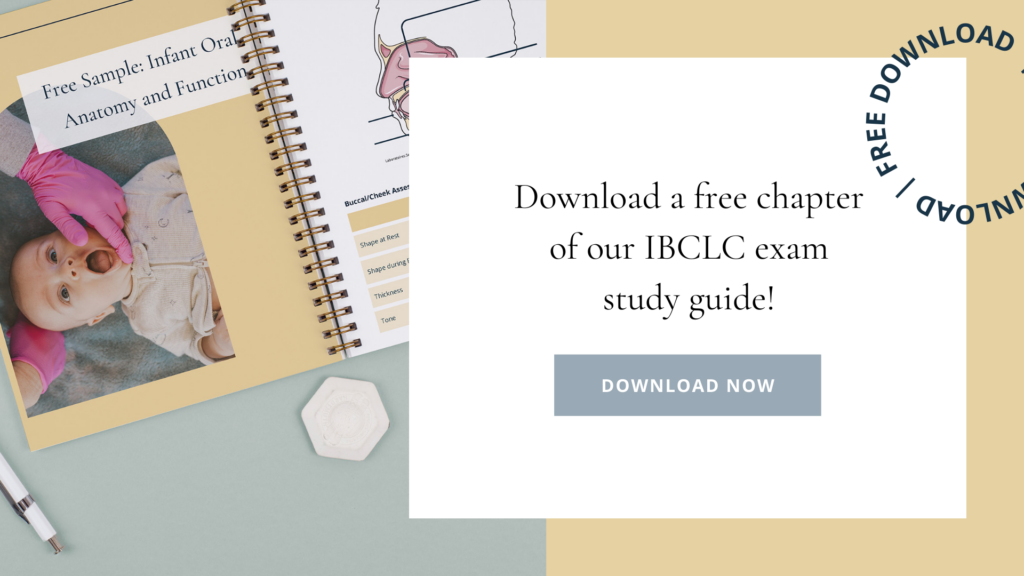How to Become an IBCLC (International Board Certified Lactation Consultant)

July 16, 2024
If you’re starting to look at how to become an IBCLC, we are SO excited for you! This field is extremely rewarding. You get to support new parents when they are in the throes of a major life change AND leave them feeling confident and prepared to handle feeding their child.
But becoming an International Board Certified Lactation Consultant (IBCLC) is complicated – there’s a lot of requirements, and they’re not usually communicated in an easy-to-understand way.
We’re aiming to change that here with this ultimate guide to becoming an IBCLC!
How to Become an IBCLC: Choosing a Pathway
There are three pathways to becoming an IBCLC. All of these pathways require you to have specific college-level courses and continuing education trainings, lactation- and communication-specific didactic hours, clinical experience hours, and to sit for the certifying exam.
IBLCE® (the International Board of Lactation Consultant Examiners®) is the international credentialing organization that established and oversees the IBCLC® (International Board Certified Lactation Consultant®) certification.

Step 1 to Becoming an IBCLC: Health Education
The first step toward becoming an IBCLC is completing certain college-level courses that will provide you with a foundational understanding of human health and psychology. You may be able to skip this step if you’re already a health professional!
Recognized Health Professions
If you are a recognized healthcare professional, IBLCE will accept documentation of your current license to practice or certification as evidence of your health education (AKA, skip to step 2!).
IBLCE Recognized Health Professions:
- Dentist
- Dietitian
- Midwife
- Nurse
- Occupational Therapist
- Pharmacist
- Physical Therapist/Physiotherapist
- Physician or Medical Doctor
- Speech Pathologist or Therapist
Health Education Required Courses
If you are not a recognized healthcare professional, you are going to need to complete specific college-level and continuing education courses. IBLCE has developed a Health Science Education Guide to provide guidance on these courses, but here’s a quick summary!
College-Level Courses
The college-level courses need to be completed at an accredited institution of higher learning and the individual must have earned a passing grade. In the US, this usually means a C- or above.
- Biology
- Human Anatomy
- Human Physiology
- Infant Growth and Development
- Research
- Nutrition
- Psychology, Communication, or Counseling
- Sociology, Anthropology, or Cultural Sensitivity
Continuing Education
While these courses do not need to be taken at an accredited institution of higher learning, they absolutely can be! They can also be simply continuing education courses offered by other organizations.
- Basic Life Support
- Medical Documentation
- Medical Terminology
- Occupational Safety
- Professional Ethics
- Universal Safety Precautions
Want help organizing your health education?
Feeding Families Education and Consulting has created a two-page Health Education Audit Sheet to help you with tracking your progress on this step. Just download, check, and plan your next steps with confidence!
Choosing Between IBCLC Pathways
After you have completed your health education, you will need to choose a pathway to
follow. The pathway you choose helps you to plan how you will move forward. Choosing which pathway is right for you can be tricky. Let’s start with some basic facts.
Pathway 1: Recognized Healthcare and Breastfeeding Support Providers
Pathway 1 is a route of becoming an IBCLC if you already are a recognized healthcare professional or a recognized breastfeeding support provider by the International Board of Lactation Consultant Examiners (IBLCE). This option is convenient if you’re already a healthcare provider working with breastfeeding parents and their babies. It allows you to use those work hours towards your clinical experience.
Pathway 1 Pros:
- If you qualify for Pathway 1, you can earn your clinical experience hours through your job if you already work with breastfeeding dyads (sets of breastfeeding parents/babies).
Pathway 1 Cons:
- Only “lactation specific” hours in your job can count towards your clinical experience hours – so if you’re a Mom/Baby RN who spends about 2 hours per 8-hour shift helping patients with breastfeeding, you’ll only receive 2 hours of “lactation-specific experience” for that shift.
- You’ll need significantly more clinical hours through Pathway 1 than those training in other pathways.
If you don’t already work with breastfeeding dyads, you may choose to find a peer who does (who can help provide you with those clinical hours outside of your job), or explore the Pathway 3 option.
Pathway 2: Accredited Lactation Academic Programs
Pathway 2 includes enrolling in and completing an accredited lactation academic program which will help you meet both your education and clinical experience requirements (similarly to a dietetic internship for dietitians, or residency for doctors).
Each Pathway 2 program that is accredited has unique admissions requirements. You can search for an accredited program here (spoiler: there’s not many). While the coordinated option allows you to finish your requirements quickly, it can also be expensive and may require you to move to a specific geographic location.
Pathway 2 Pros:
- You will not have to source your own lactation education courses or clinical hours.
- This type of program allows you to finish your requirements quickly.
Pathway 2 Cons:
- These programs are often expensive, and may require you to relocate if you don’t live near an accredited option.
If you choose to pursue a Pathway 2 program, the remainder of this post will not apply to you (but feel free to check out our IBCLC exam study guide, which does!). Please reach out to your chosen Pathway 2 program for further instructions.
Pathway 3: Mentorship with an IBCLC
A more “build your own” approach, Pathway 3 allows you to identify an IBCLC mentor who will help to train you in specific clinical competencies. It can be challenging to find an IBCLC mentor through Pathway 3. However, if you are looking to start a private practice or work in an employment environment that is different from where you currently work, this option provides direct supervision, and you can tailor it to your goals.
If you know that you would like to pursue a Pathway 1 or a Pathway 3, continue on to step 2.

Step 2 to Becoming an IBCLC: Lactation and Communication Specific Education
IBLCE requires 90 hours of lactation specific and 5 hours of communication specific education.
Lactation Specific Education
- Hours required by IBLCE: 90
- You will want your lactation specific education to cover all of the topics in the IBLCE Detailed Content Outline.
- You can gather these hours in various ways, but the Lactation Education Accreditation and Approval Review Committee (LEAARC) helps to make this easier by endorsing courses that provide lactation education.
- LEAARC approved courses provide all 90 hours of lactation specific education. LEAARC recognized courses only provide a portion of the lactation specific education.
LEAARC Approved Lactation Specific Education
The Infant Feeding Counselor Course offered by Feeding Families Education and Consulting is LEAARC approved AND provides you with the 5 hours of communication education. We did this to make it easy for you to check step 2 off your list. To learn more about how to become an IBCLC through the Infant Feeding Counselor credential, download our guide.
Step 3 to becoming an IBCLC: Clinical Experience Hours
Pathway 1: Recognized Healthcare and Breastfeeding Support Providers
If you are choosing to go through Pathway 1 as a recognized healthcare professional or a recognized breastfeeding support provider, then you will track your hours on the job.
Only hours spent providing direct care to lactating individuals count. You will need 1000 documented clinical hours to be eligible to sit for the IBCLC certifying examination. While IBLCE does not require formal supervision under pathway 1, research shows that confidence in entry-level skills improved when mentored by four or more preceptors.
Pathway 3: Mentorship with an IBCLC
If you are choosing to go through Pathway 3, you will need to identify IBCLC mentor(s) to supervise you for 500 clinical hours. Research shows that confidence in entry-level skills improved when mentored by four or more preceptors, so more mentors are better. Once you have identified these mentors, you will submit a Pathway 3 application. For more information about submitting a Pathway 3 application, go here.
You cannot begin accumulating hours prior to having an approved Pathway 3 plan. Once you have an approved plan, mentors can provide supervision! This can be in person or via telecommunication and offer you feedback to help improve your skills. As you gain confidence and experience, your mentors will allow you to work more independently, with a goal of having minimal supervision towards the end of your 500 hours.
Currently, Feeding Families Education and Consulting only provides mentorship to individuals who have completed the Infant Feeding Counselor course.
Step 4 to Becoming an IBCLC: Sit for the IBCLC Certifying Examination
Once you have completed all the requirements, you will need to take the IBCLC certifying examination. This exam is currently only offered twice a year – in April and in September. You can get all of the most current information on the upcoming IBCLC exams here. For more instructions on how to apply for the IBCLC exam, go here.

Are you ready to start studying for your IBCLC exam? We have an exam study guide that helps you organize this process. Download a free sample of the exam study guide here.
Filed under
Published on
Teaching is our specialty
In the field of healthcare, staying up-to-date
isn’t just nice – it’s necessary.
Join our email list to stay current on our continuing education and mentorship options for aspiring and current IBCLC’s!
A team of lactation & nutrition professionals dedicated to helping you start and continue your career in infant feeding.
Meet The Feeding Families Education & Consulting Team
You want to change the face of healthcare.
We want to help you do it.
Through a student-focused approach to teaching and constant commitment to inclusive infant feeding care, we help aspiring and current IBCLCs build the confidence, clarity, and clinical skills they need to support real families.
© 2025 Hope Feeds Babies Lactation, LLC | Policies | Website by Hello & Co. Creative
Subscribe
About
IFC® IBCLC Course
IBCLC Study Guide
Freebies
Speaking & consulting
Contact Us
Blog
CLS to IFC® Fast Track
Learn
Explore
CERP Library
The IFC® Credential
Mentorship Program